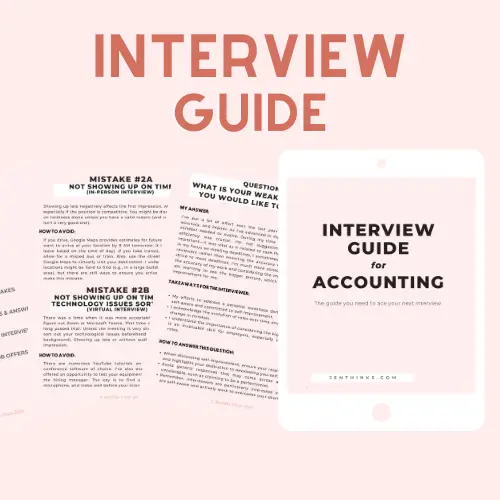My last CPA PEP module officially started one week ago. Since I work in the industry and passed Finance, I had a choice* between Performance Management, Assurance (audit) or Tax. It wasn’t a difficult choice for me as I had always known I wanted to take Finance and Performance Management. The schedule also worked out so that I can take extended Finance instead of extended Performance Management as my research told me that Finance was more difficult.
For those of you who have a choice on which elective to take, I want to share with you why I chose the Performance Management module over the other two and also the topics the module covers.
RELATED POST – What Is The Extended Module And How Does It Work Exactly?
Why Did I Choose the Performance Management (PM) Module?
People/Managerial Skills
As its name implies, the performance management module covers topics on the management of performance. This is a skill all managers with direct reports will benefit greatly from, regardless of the company or industry you work in. One might even argue that anyone, whether in a managerial position or not, will benefit from learning about performance measurements. Personally, I definitely agree with the latter after I have been in positions that report and get reported to. Without an objective way to measure performance, we are prone to making unfair, subjective assessments (we are humans after all) and/or not making progress/improvements due to the lack of feedback. Therefore, as a future CPA, I believe managerial skills will be beneficial to my career.
Strategy & Governance
It might be clear by now that I am choosing my CPA PEP elective module based on my career goals. One of my goals would be to hold a position that helps the company I work for formulate its strategy. For some, including myself, it might sound like a faraway goal right now. However, it is never too late to start preparing yourself for when the opportunity presents itself. Also, learning about the process of strategy formulation is helpful to things that you might not have thought about. For example, I set a vision and mission for jenthinks this year. Even though my blog isn’t a “company” just yet, I know it will never be unless I start treating it like one.
What Topics Does the Performance Management Module Cover?
TOPICS PREVIOUSLY COVERED IN CORE MODULES
Management Accounting
Costing
Cost-Volume-Profit, Nature and Classification, Methods, Pricing & Transfer Pricing
Every company sells something, whether it’s a physical product, virtual offering or professional service; therefore, the topics on cost will be useful and applicable to a wide range of jobs CPAs hold
Budgeting
Big Picture, Master and Cash Budgets, Pro Froma Statements & Variance Analysis
I am a true believer in budgeting for all entities big and small, human or companies. A budget is also the starting point for a forecast and without it, you will be heading into the unknown without a clue what will likely happen. It is true that things could change regardless of how well you planned (e.g., the pandemic), however, a budget will allow you to spot and investigate variance and come up with plans to respond to changes outside of your control.
Performance Measurement
Big Picture & Balanced Scorecard
As I have already shared in the previous section, I believe performance management is a skill everyone can benefit from. The PM module refreshes our memories on one of the most popular methods, the Balanced Scorecard. Many companies use variations of this popular technique to some degree to keep track of company and individual performances.
Other
Relevant Information for Short Term Decisions
This skill can be applied to a situation as technical (capital budgeting analysis like buying a piece of equipment) or as trivial (making a decision on whether to continue waiting for the elevator) as you wish
Quality Control and Process Improvement
My opinion is that regardless of the job you are in, there is always room for improvement. Accountants have come a long way from relying solely on manual data entry but there are still plenty of opportunities for process improvements.
Information Systems
Design, Acquisition, Development & Data Integrity
Throughout my career, I have personally witnessed the negative consequences a badly-planned system implementation can bring and also been a small part of system implementation. These experiences have taught me the importance of system implementation. A replacement or new system will only realize its true potential through careful planning and execution. Also, with the sudden rise of remote work, maintaining data integrity remotely is more important than ever.
~ More CPA Posts ~
CPA PEP Core 1 – How to Study for the Module and the Exam
CPA PERT – Ultimate Guide on How to Get Your First Experience Report via EVR Approved
CPA PERT – Enabling Competencies Examples
Densmore for CPA PEP – Are The PEP Essentials Packages Worth It?
CPA PEP Module – Regular Module or Extended Module?
Strategy and Governance
Strategic Process
Big Picture, Vision, Mission, and Values, Formulation, Implementation & Government and NPO
This is another point that I have already shared in the previous section – strategy and governance. Companies big and small should have a clear and up-to-date vision, mission and values to guide their strategic decisions. It is also important to note the similarities and differences between for-profit (profit maximization) and government/not-for-profit (resources utilization) entities.
Governance
Structure, Organizational Structure & Ethics and Corporate Social Responsibility
Depending on the size of the company you work for, the corporate structure can be very different than another company in the same industry. Understanding the different structures is crucial to decision making as a company grows and scales.
Internal and External Analysis
A company’s internal and external environments serve different purposes but are just as important. For example, a company will not thrive without the right people and internal processes even if the economy is ripe for what it’s offering. The opportunities will simply go to the competitor that has the right core. Therefore, it is important to be able to analyze both internally and externally.
Enterprise Risk Management
A company faces all kinds of risks: foreign currency, political, commodity price etc. Since it is not realistic to take action against all risks possible, a CPA needs to be able to identify and analyzes them. Depending on the magnitude of the consequences and likelihood of incidents, a company can decide what actions to take against each of them.
TOPIC ASSIGNED TO ELECTIVE MODULE STUDENTS
Strategy and Governance
Strategic Process
Performance Management
The only topic that is new to the Performance Management elective module (not introduced in Core 2) is performance management for the strategic process. This is crucial because knowing how to formulate and implement a strategy is not enough. In order for a strategy to be effective, CPAs need to know how to measure performance objectively.
*Note, if you want to work in public accounting, you must take both Audit & Assurance and Tax modules in order to apply for the Public License with your provincial body.


